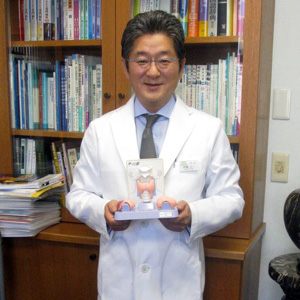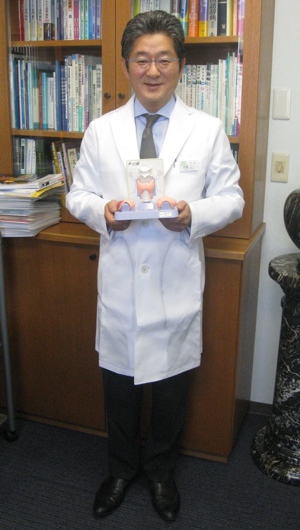
Words to Live by: Endocrine surgeon Dr. Koichi Ito
It’s therapeutic to keep the memory of our loved ones alive. One of our colleagues, Dr. Takashi Mimura passed away one year ago, at age 77. We made his desk into a little shrine. We put all the things he loved on it — beer, cigarettes, his favorite sweets — and lots of photos of us with him. No other person will use that desk. He is with us forever. His desk is near the entrance so we say hello and goodbye to him every day. It’s like he’s still with us, but he’s off that day.
Once people are traumatized, the psychological scars might heal but certain issues will remain sensitive. Radiation therapy is very strictly regulated in Japan because of our tragic history, being the only nation to suffer from two separate atomic bombings. In Japan, the government limits the maximum dose of radioiodine (iodine-131) — the substance we use to treat cancer patients — to 500 MBq per person per day, while most countries allow 1,110 MBq for standard therapy. Also, we must hospitalize patients undergoing iodine-131 treatment, while abroad, outpatient care is possible. The idea that a patient undergoing therapy might emit harmful gamma rays and affect others is still extremely strong in the minds of Japanese. The rules, however, severely limit the number of patients we can help and the speed of the procedure. We’ve lobbied for change, but so far it’s been in vain.
A person working in the field knows more than anyone at a design table. One of our physicians, Dr. Takehiko Tsuchiya, designed and made a machine for thyroid uptake tests. We collaborated with Toshiba to produce it for us and now it’s sold on the market. This is typical in Japan; here many people are amateur engineers who design and build their own machines. That’s why there’s such a variety of Japanese high-precision medical equipment.
Universal health care is a human right. Japan can be proud of its high-quality health-care system. Everyone is covered and the low prices are government-regulated so the same procedure costs the same all over the country. This is wonderful for patients as it provides an extremely people-friendly medical system, where everyone gets equal treatment. I’m not surprised that nowadays many tourists visit Japan for medical care.
Predictions are often wrong. In the 1970s, we were told that by 2010 Japan would have more physicians than available positions. And look what happened! Japan is struggling with a shortage of doctors. One reason is that people are living longer than we imagined; another reason is that many female doctors quit the profession after getting married. Nobody could have predicted the current situation back then.
Women patients often prefer female doctors. We conducted extensive research and discovered that this is the case. So, since the 1990s we’ve been hiring more female physicians. Today half of our doctors are women, but since 90 percent of our patients are female, we still have a long way to go.
You understand others’ feelings when you’re in their shoes. My father had a heart attack four years ago and suddenly I wasn’t a doctor but the son of a patient. I was shocked at the amount of paperwork I had to do: lots of release forms in legal lingo I could barely comprehend. It made me feel really sad. I realized how much Japan had changed. These types of contracts don’t match the Japanese spirit, which is based on trust, not signatures. I signed them all, but it dawned on me that our hospital had to follow the trend and provide such forms to our patients too.
Not only can we learn from mistakes but we also can teach others how not to make them. In 12 years, we had four malpractice claims against our hospital. We won every case, but it took a lot of time and we lost some confidence. Instead of hiding these experiences, I share them with other doctors because I think that we must keep everything transparent and out in the open in order to further protect our patients and ourselves.
The joy we get from helping and healing people keeps most of us doctors healthy and working until late in life. The beauty of our profession is that we can help people as long as we are healthy ourselves. My father is 87 and works full-time. So are my professors in Japan and those in the United States. My mentor, Dr. Edwin L. Kaplan at the University of Chicago Medical Center, is 74 and performs 220 surgeries a year.
Just because you have no symptoms, it doesn’t necessarily mean you are healthy. In Japan, one in every 10 women over age 40 has some sort of thyroid abnormality. Many of these abnormalities are so mild that the sufferer can live a healthy life without any symptoms or treatment, but some eventually develop into serious diseases. Catching such problems early is crucial. That’s why in Japan, a thyroid examination is part of the routine yearly health check.
Some forms of cancer are not scary anymore. The 20-year survival rate after diagnosis of thyroid cancer is an incredible 95 percent! Hearing such good news certainly helps the healing.

This QuoteUniversal health care is a human right. — Dr. Koichi Ito